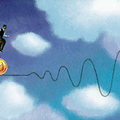The Internet can seem an all-knowing, mysterious oracle. Type in a question, hit a button and an answer magically appears.
Yet oracles earn their robes not for providing trivia (“Caesar, did you know that “ides” is a Latin term denoting half a month?”), but for predicting the future, however Delphically. And for a brief period recently, the Internet seemed to have crossed that threshold.
The backdrop was the bizarre tale of the professional wrestler Christopher Benoit who during one weekend last month killed his wife, Nancy, and later his son and himself. The police didn’t find the bodies until Monday afternoon, June 25, but a Wikipedia entry on Mr. Benoit had reported his wife’s death matter-of-factly 13 hours earlier.
Was there some error with the time stamped on the article? Was a witness choosing to speak under cover of anonymity? Or was the killer posting a final warning? Intriguingly, the IP address used to write the prophetic posting was traced to Stamford, Conn., which happens to be the home of World Wrestling Entertainment, the employer of Mr. Benoit.
As a furor grew, the anonymous user of Wikipedia who posted the Nancy Benoit information (known by the IP address 69.120.111.23) came forward to say, “I did the wrong thing by posting it on Wikipedia,” adding, “I was just as shocked as everyone when I heard that this actually would happen in real life.”
The police nonetheless questioned that person. Investigators “checked it out very thoroughly” and concluded “it was pure coincidence,” said Lt. Belinda McCastle of the Sheriff’s Department of Fayetteville, Ga., where the killings occurred. She declined to release the name of the owner of the IP address 69.120.111.23.
The Benoit case, minus that part about predicting the future, isn’t unique. There was the case of the film director and actress Adrienne Shelley, who was murdered in Greenwich Village last year. Editors at The New York Times were given a tip, and in the course of reading about her on Wikipedia (yes, newspaper editors read Wikipedia), saw that her death had already been listed. In fact, it was a full day later before the news became public knowledge, as we usually think of it.
The British newspaper The Guardian reported a similar experience in 2005, when editors there found the only confirmation of the death of the feminist writer Andrea Dworkin on Wikipedia.
Robin Hanson of George Mason University, an expert on using future markets to track public sentiment, said an e-mail exchange that these examples are hardly evidence of predicting the future. Rather, he suggested, it was “a bit newspaper-centric to say that news has not broke ‘publicly’ if it is being discussed online in rumors but has not appeared in a newspaper.” He added that “with more and more kinds of media, there are more and more intermediate levels of info availability.”
This is the crucial dividing line: between reporting on events in as close to real time as possible — which can prove jarring to society, and journalists in particular, but hardly supernatural — and predicting things around the bend.
As the Benoit case and others show, it may be human nature to confuse the two. The classic grifter swindle portrayed in the 1973 movie “The Sting” fools its target by holding out the possibility of using the telegraph to “predict” horse-race results.
But there are businesses that see the odds in getting information as close to real time as possible using Internet searches. At the core of this research is the hope of tapping into something intuitive about people — the way some people believe animals sense an earthquake coming and scatter.
Bill Tancer, the general manager of Hitwise, a company that analyzes search results, calls the field “searchonomics.” Thus far, he has tested his theories in a manner that resembles so-called future markets — which trade bets on future events like elections and sporting events — by treating search requests as the equivalent of votes, or “buys,” and then adjusting for other factors. (The reality TV show “Dancing With the Stars” has been his unwitting laboratory — to mixed results, he concedes.)
But these tools can be used for weightier matters. Tracking searches of the word “unemployment” can provide clues to trends in the nation’s unemployment rate, Mr. Tancer said. Likewise, Altos Research, a Silicon Valley start-up, collects and tracks millions of real estate listings to assess the housing market before the government releases its figures.
This information serves a Wall Street function as “closer to real time” data for investors, said Michael Simonsen, Altos’s president and chief executive.
“We are really early in the predictive power of the Internet; financial markets are getting a hang of it,” he says. “We have miles to go in all the nuances in capturing information.”
A more nuanced analysis was made by Mr. Tancer, who tracked searches in 2005 concerning avian flu. By comparing different terms, from the technical name “H5N1” to “avian flu” to the more basic “bird flu” he tried to show how a spike in interest first appeared among what he presumes was the scientific community (H5N1 searchers) and then quickly spread to the general public.
Armed with this insight, it may be easier to see when concern over a potential epidemic is going to “go big.” But these insights will be culled from millions of data points, not from single Wikipedia entries like the one for Mr. Benoit.
It is eerie to note, however, that the anonymous poster about Ms. Shelley’s death had earlier in the year edited the Wikipedia entry about the so-called Butterfly Effect, the notion that a butterfly flapping its wings in China can influence the weather in Florida. It’s as if that user — 216.165.95.5 — knew that someone typing something into a computer can influence an editor in a newsroom far away.
Or it may have been a coincidence.





